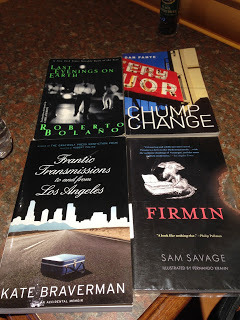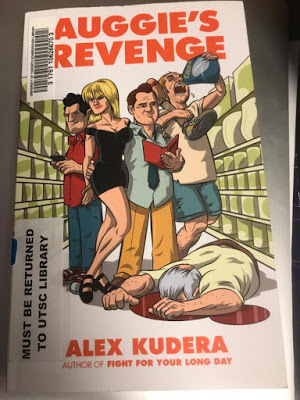Alex Kudera's Blog, page 84
March 9, 2019
Old friends and new. . .
Published on March 09, 2019 08:04
March 6, 2019
Lux Chen in New York City
"At night, I kept having this dream in which I went back to school to finish my doctoral degree but could not find my classroom. Once, when I finally followed the crowd into a giant, round auditorium, what greeted me was a sparkling black coffin at the center of the podium, surrounded by candles, flowers, and a children’s choir. It was not a class, but a stranger’s funeral. Or was the funeral for me?"
from Lux Chen's "How The Great Gatsby Saved My Life"
from Lux Chen's "How The Great Gatsby Saved My Life"
Published on March 06, 2019 22:06
March 5, 2019
K. J. P. Garcia
"In some ways, I had to go non-stop to make any inroads into the literary world. And, I have degrees in English and linguistics. This is a fairly common story for many writers of color, endless work and limited audience/engagement. Or, when the emergence comes, it comes after many years of trying. Certainly, this may be common for any creative person but POC (People of Color) come to the shore with so much historical and linguistic cargo that we’re already at a disadvantage in the eyes of some publications who only have their ports open to certain sorts of boats."
~~ Kenning JP García
~~ Kenning JP García
Published on March 05, 2019 21:24
March 4, 2019
What if I wasn't meant to be a novelist. . .
"My success, however, turned out to be the beginning of my failure, the first death throes of a dream. After all, if you never finish a novel, you save yourself finding out if it’s any good or if anyone wants to publish it. Unless you finish, you can never truly, heartbreakingly fail."
~~ Aaron Shulman
~~ Aaron Shulman
Published on March 04, 2019 01:51
February 27, 2019
February 24, 2019
Tikkun
Published on February 24, 2019 20:06
February 19, 2019
Hampshire College
Some of my most fond memories from Wesleyan entail driving an hour north to play in Ultimate Frisbee tournaments at Hampshire College as well as hosting their team at Wes, so it is not only to protect liberal arts colleges in general that the news Hampshire may close is disappointing. So far, it's not clear as to what will happen although I believe that Hampshire has decided to admit a smaller class for Fall semester, 2019, with the thinking that it is much more appropriate to guarantee four years for a smaller number of students than to shut the doors on students who would be forced to leave before graduation. Undoubtedly, colleges and universities assigning Fight for Your Long Day and Auggie's Revenge as university-wide or first-year Book of the Year selections will have a much better chance of surviving than the others. Indeed, the experiences of the protagonists (or anti-heroes) of these novels is central to the predicament of the humanities in the twenty-first century, so I hardly see hope for any liberal arts college or curriculum failing to consider these novels.
Published on February 19, 2019 22:17
February 18, 2019
"A great line editor is a miracle. . ."
In literature class, I'm teaching Kate Braverman's "Tall Tales from the Mekong Delta" and Jayne Anne Phillips's "Home," so that sent me searching for articles about the former (follow this link for an interview with Braverman) and news of the latter. For Phillips, I found Nick Ripatrazone's memories of her as a teacher and editor in "Is Line Editing a Lost Art?""A great teacher is a gift. A great line editor is a miracle. Jayne Anne Phillips was both. Her pen-marked copies of my manuscripts were concise lessons in form and function. I sat in her office at Rutgers-Newark, and hung on her every observation. She conferenced with students the hour before our workshops. Those weren’t superficial conversations; Jayne Anne did real work. She went through the whole story, sentence to paragraph to page. She spoke about my stories—my shaky drafts, my ambitious scenes—as if they mattered. We respected her. She intimidated us—not because she was unkind. Because she was such a gifted writer."Like Jayne Anne, my undergraduate fiction professor grew up in West Virginia, and we read her short fiction in advance of her campus visit. Black Tickets possessed me. Other books would grab me—In the Heart of the Heart of the Country by William H. Gass, Mariette in Ecstasy by Ron Hansen, Hue and Cry by James Alan McPherson—but Black Tickets was first. All writers need a book that makes them believe that words matter. Her book did that for me."
Published on February 18, 2019 22:36
February 12, 2019
Kate Braverman's "Jewish money"
"Right from the beginning," Braverman says, "I had subversive instincts." Born in Philadelphia, she moved to Los Angeles with her Jewish parents and younger brother, Hank, in 1958, the year the Dodgers left Brooklyn. She was reared on welfare in "the stucco slums" of Los Angeles. No car, none of the glamour one associates with Los Angeles. Her father gambled; her mother had a nervous breakdown. Alienated, suffering a "squalid adolescence," she took refuge in books.
Because "Frantic Transmissions" is spotty on details, I ask Braverman what her father did when he worked. "He had cancer and so he was a professional invalid," she sighs. "We came to California originally because he was not expected to survive the winter back East. And lo and behold, he survived 25 years of Los Angeles."At 15, she ran away to Berkeley, lived with a group of UC students, collected food stamps and wore Army surplus outfits. She went to Berkeley High, then UC Berkeley and returned to Los Angeles in 1971. L.A. scorched her soul but Braverman found connections in the alternative culture of the '70s and '80s. Her best-known novel, "Lithium for Medea," came from that period. At the Venice Poetry Workshop, her students included John Doe and Exene of the band X. She was a drug addict for 17 years, the first 14 with IV cocaine, then "a shorter but rather intense excursion into heroin addiction."~~ Edward Guthmann, January 30, 2006
Because "Frantic Transmissions" is spotty on details, I ask Braverman what her father did when he worked. "He had cancer and so he was a professional invalid," she sighs. "We came to California originally because he was not expected to survive the winter back East. And lo and behold, he survived 25 years of Los Angeles."At 15, she ran away to Berkeley, lived with a group of UC students, collected food stamps and wore Army surplus outfits. She went to Berkeley High, then UC Berkeley and returned to Los Angeles in 1971. L.A. scorched her soul but Braverman found connections in the alternative culture of the '70s and '80s. Her best-known novel, "Lithium for Medea," came from that period. At the Venice Poetry Workshop, her students included John Doe and Exene of the band X. She was a drug addict for 17 years, the first 14 with IV cocaine, then "a shorter but rather intense excursion into heroin addiction."~~ Edward Guthmann, January 30, 2006
Published on February 12, 2019 21:12
Fat City
I've never read Leonard Gardner's contemporary classic Fat City, but I recently enjoyed this new interview with the author in The Paris Review.
Published on February 12, 2019 01:54





